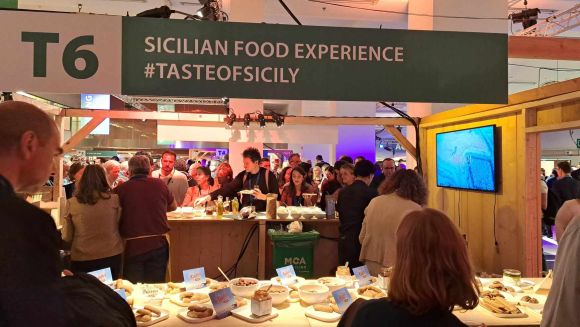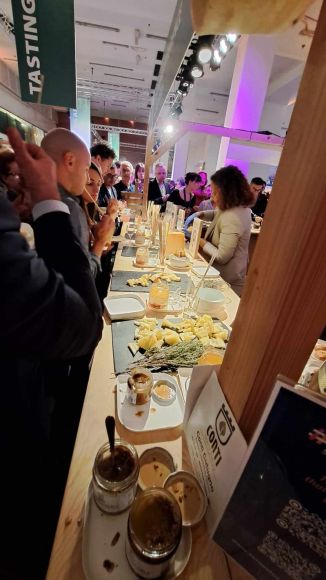
Visitors of the 21st European Week of Regions and Cities have been taken on a journey from the heart of Brussels all the way to Sicily, an island in center of Mediterranean, as a part of ‘Sicilian food experience’ that was held on Tuesday 10th October. The tasting was put together by Dr. Margherita Caccamo – Macro Area Research and Development CorRFILaC and by Dr. Francesca Cerami – Director of Idimed and Coordinator of the Sicilian Territories’ Supply Chain District Network – C.I.B.O.
The stand showcased an assortment of typical Sicilian agri-food products provided by local production chains. Interested visitors were provided with a wide variety of cheeses and spreads such as jams, preserves, paté and pesto that they could have paired with biscuits or traditional Sicilian bread made with durum wheat that was topped off with olive oil. Next to an array of dried herbs, there were roasted chickpeas, almonds, natural hazelnuts, pistachios and peanuts. For those with a sweet tooth, there were cookies and various pastries, as well as Sicilian manna or, as it is sometimes called, ‘nectar of the gods’ produced form the sap extracted from ash trees. Along with the traditional food there were local wines, liquors and beers that guests could have enjoyed.

However, the showcased traditional cuisine should not only be taken as food or as a substance that keeps us alive. It is rich with culture, and it can be a way of communicating ideas, values, identities and attitudes through its preparation, packaging, or presentation. This was implemented on the ‘Sicilian food experience’ stand where single use plastic was nowhere to be found. The plates were made of paper, while the cutlery that was offered was wooden. The food has also been prepared locally, which not only uplifts the Sicilian businesses, but it is also an eco-friendlier way of producing.
It has always been said that the way to someone’s heart is trough their stomach. Food has always been a way bring people together for family dinners, corporate meetings, but it also brings countries together. Gastro diplomacy is the usage of food as a diplomatic instrument that connects countries through understanding cultures, habits, rituals and traditions. That is where the significance of events, such as this one, lays. Tolerance and inclusivity come from understanding and appreciating cultural heritage and practices of other people, and while engaging in culinary practices of other countries we are doing exactly that.
Written by Ramona Salha
Edited by Nina Bo Wagner



